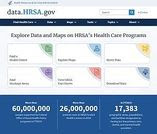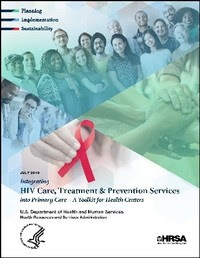
HHS Awards Nearly $400 Million to Help Community Health Centers, Academic Institutions, and Rural Organizations Combat the Opioid Crisis
 |
September 19 – the U.S. Department of Health and Human Services (HHS) Health Resources and Services Administration (HRSA) awarded over $396 million to combat the opioid crisis. The investments will enable HRSA-funded community health centers, academic institutions, and rural organizations to expand access to integrated substance use disorder and mental health services. The awards support HHS's Five-Point Opioid Strategy, which launched last year to empower local communities on the frontlines of the national epidemic.
"HRSA is committed to fighting this crisis by supporting our grantees with resources, technical assistance, and training to integrate behavioral health care services into practice settings and communities," said HRSA Administrator George Sigounas MS, Ph.D. “These funds enable HRSA grantees to continue to implement or expand substance use disorder and mental health services across the Nation.
Read the HHS Press Release on the Department's opioid-specific grants to help combat the crisis ravaging our country.
HHS Awards $21 Million to Support Health Center Participation in NIH’s All of Us Research Program

September 11 – the Department of Health and Human Services’ (HHS) Health Resources and Services Administration (HRSA) awarded $21 million to 46 community health centers to support their participation in the National Institutes of Health’s (NIH) All of Us Research Program. All of Us is a national effort to gather data from one million or more U.S. residents to accelerate research and improve health by taking individuals’ differences in lifestyle, environment, biology and other factors into account. HRSA’s investment supports community health centers’ capabilities to enroll and retain participant partners in All of Us, which seeks to advance precision medicine.
“HRSA-supported community health centers’ participation in the All of Us Research Program is a critical opportunity for individuals from all walks of life to be represented in research and support the next generation of medical innovation,” said HHS Secretary Alex Azar. “All of Us will lay the scientific foundation for a new era of personalized, highly effective health care. We look forward to working with people of all backgrounds to take this major step forward for our nation’s health.”
The HRSA funding will also advance health centers’ interoperability functionality, preparedness to use and share patient data, and capacity to participate in future research opportunities.
|
HRSA Delivers Hurricane Aid

HRSA-supported community health centers across six southern states and two U.S. territories that were affected by hurricanes Harvey, Irma and Maria last year received special funding September 6 through the Capital Assistance for Hurricane Response and Recovery Efforts (CARE) initiative -- designed to help underwrite repairs and ensure continued access to primary health care services in their communities.
|
MCHB Launching Opioids Challenge

On September 19, MCHB Grand Challenges launched the Addressing Opioid Use Disorder in Pregnant Women & New Moms Challenge prize competition.
Pregnant women and new mothers with opioid use disorder often face barriers obtaining safe and effective care and treatment, with women in rural and under-resourced communities being particularly affected. We need your ideas for how to address this urgent issue! This Challenge will award up to $375,000 for innovative solutions.
|
Check Out HRSA's New Data Website

HRSA’s Data Warehouse team has launched DATA.HRSA.GOV, the new website for open data. The site is interactive, easy to use, accessible, and works on mobile devices. New features include interactive visual dashboards for displaying data on grants and organ donation, as well as a video introduction.
Try it out now at https://data.hrsa.gov, and provide feedback to us at data@hrsa.gov.
|
TargetHIV: New Name, New Look

HRSA’s HIV/AIDS Bureau (HAB) is pleased to announce the launch of the newly rebranded and redesigned TargetHIV website, formerly known as the Technical Assistance, Guidance, Education, and Training (TARGET) Center.
TargetHIV is the central repository for technical assistance (TA) resources for the Ryan White HIV/AIDS Program. The website now features a modernized design and user interface, streamlined navigation, and updated technology to make it easier to find important TA content.
To learn more about what’s new, read our blog post on HIV.gov.
|
The Long Ride From Halfway

Kay Young was packing her bags for a three-week trip when the headache hit – so suddenly that it dazed her. She remained conscious, but words escaped her. And help was not near at hand.
The town of Halfway, Oregon, is in the northeast corner of the state, near the Idaho border and the Payette National Forest. Population: 288, and falling. One of every five households is occupied by a person over age 65, living alone. It's about as rural as a rural town can get, and still be called a town. It was a bad place for Kay Young to be struck by an aneurysm. |
Now Available: Health Center Toolkit for Integrating HIV Services

HRSA announces a new toolkit for health centers: Integrating HIV Care, Treatment & Prevention Services into Primary Care. The toolkit compiles resources and lessons learned during the three-year Partnerships for Care demonstration project.
With modules focused on planning, implementing, and sustaining HIV services, the toolkit meets your health center where it is today and offers recommendations for future improvement in HIV care.
|
National Advisory Committees Accepting Nominations for New Members
HRSA is seeking nominations for new members to serve on its Council on Graduate Medical Education (COGME). COGME provides an ongoing assessment of physician workforce trends, training issues, and financing policies, and recommends appropriate federal and private sector efforts on these issues. COGME advises and makes recommendations to the Secretary and to the Senate Committee on Health, Education, Labor and Pensions, and the House of Representatives Committee on Energy and Commerce.
You may nominate yourself or others. Professional associations and organizations may also nominate qualified candidates.
Members are appointed based on their competence, interest, and knowledge of the mission of the profession. HRSA encourages nominations of qualified candidates from all groups and geographic locations. Nominations are accepted on a continuous basis.
For more information, contact HRSA’s Bureau of Health Workforce.
HRSA's Strategy to Address Intimate Partner Violence: Integration and Innovation in Practice Friday, Sept 21, 3:00 p.m. – 4:00 p.m. ET.

HRSA Office of Women’s Health will provide an overview of the HRSA Strategy to Address Intimate Partner Violence and share examples of activities that focus on training and tools for health care settings.
|
HRSA Study Finds Most U.S. Youth Lack Support Transitioning to Adult Health Care

September 17: Research published in Pediatrics found that only 17% of U.S. youth with special health care needs, and 14% of youth without special health care needs, are getting guidance on planning for their transition to health care as adults. Led by HRSA researchers, the analysis used 2016 data on 12- to 17-year-olds from HRSA’s National Survey of Children’s Health.
Privacy and consent policies, insurance coverage, and other facets of health care change when adolescents reach 18 years of age. Previous research has shown that youth who do not receive support for transition to adult health care tend to have more trouble adhering to treatments and visit the emergency room more often, among other consequences.
The findings underscore the need for health care providers to work with all youth independently throughout adolescence, in collaboration with parents, to help them gain self-care skills and prepare for adult-focused care.
This Month
September
Funding OpportunitiesHealth Centers
Service Area Competition - Apply by
October 9 Health Workforce
State Primary Care Offices - Apply by November 5
Healthcare Systems BureauHIV/AIDS
Ryan White HIV/AIDS Program Part A HIV Emergency Relief Grant Program - Apply by September 21
AIDS Drug Assistance Program (ADAP) Emergency Relief Funds (ERF) - Apply by October 25
Maternal & Child Health
Healthy Tomorrows Partnership for Children Program (HTPCP) - Apply by October 1
Rural Health
Rural Health Network Development Planning Program - Apply by November 30
|






















.png)









No hay comentarios:
Publicar un comentario